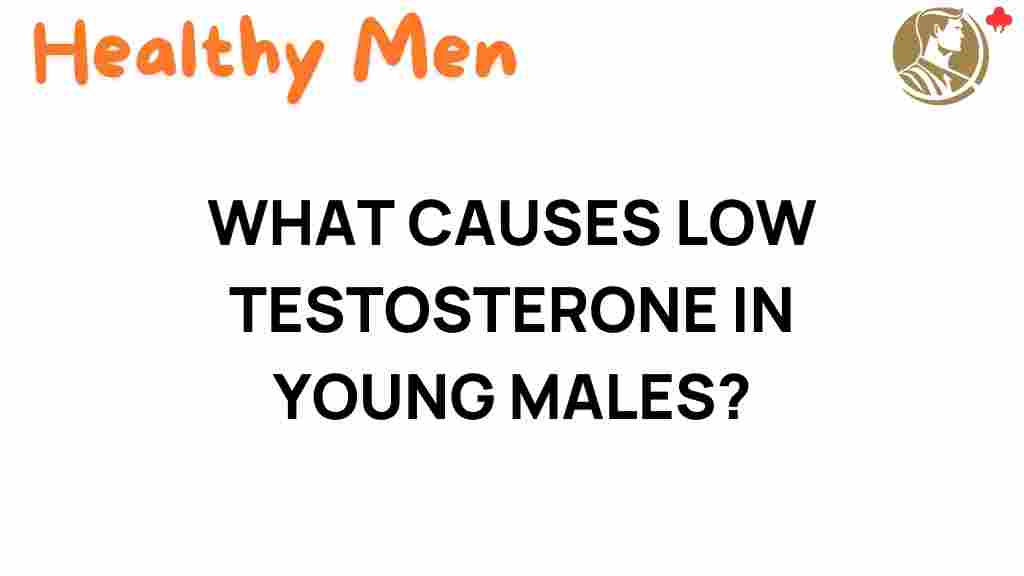Unveiling the Mystery: What Causes Low Testosterone in Young Males?
Low testosterone, also known as hypogonadism, is increasingly being recognized as a significant health issue among young males. This condition, characterized by lower-than-normal levels of testosterone, can lead to a myriad of health issues, affecting both physical and mental well-being. Understanding the causes of low testosterone in young males is essential for addressing this hormonal imbalance effectively. In this article, we will explore various factors contributing to low testosterone, including lifestyle factors, medical conditions, nutrition, exercise, and mental health.
Understanding Low Testosterone in Young Males
Testosterone is a vital hormone in the male body, responsible for numerous functions, including:
- Regulating libido and sexual function
- Maintaining bone density
- Supporting muscle mass and strength
- Influencing mood and cognitive function
When testosterone levels drop below the normal range, young males may experience symptoms such as fatigue, depression, low libido, and reduced muscle mass. Identifying the root causes of low testosterone is crucial for restoring hormonal balance and improving overall health.
Common Causes of Low Testosterone in Young Males
Several factors can contribute to low testosterone levels in young males. These can be divided into lifestyle factors, medical conditions, and mental health issues.
Lifestyle Factors
Many lifestyle choices can negatively impact testosterone production. Some of the most common lifestyle factors include:
- Poor Nutrition: A diet low in essential nutrients can lead to hormonal imbalances. Nutrients like zinc and vitamin D are particularly important for testosterone production.
- Physical Inactivity: Sedentary lifestyles can contribute to weight gain and obesity, both of which are linked to lower testosterone levels.
- Excessive Alcohol Consumption: Heavy drinking can disrupt hormone levels and damage the testes, leading to decreased testosterone production.
- Drug Use: The use of anabolic steroids or other recreational drugs can interfere with the body’s natural hormone production.
Medical Conditions
Certain medical conditions can also lead to low testosterone levels. Some of these include:
- Hypogonadism: This is a condition where the body doesn’t produce enough testosterone due to issues with the testes or pituitary gland.
- Obesity: Excess body fat can disrupt hormone levels, leading to lower testosterone production.
- Type 2 Diabetes: Insulin resistance associated with diabetes can negatively impact testosterone levels.
- Chronic Illness: Conditions like kidney disease, liver disease, and HIV/AIDS can affect hormone production.
Mental Health Issues
Mental health plays a significant role in hormonal balance. Stress, anxiety, and depression can all contribute to low testosterone levels. Chronic stress, in particular, elevates cortisol levels, which can interfere with testosterone production.
Furthermore, mental health issues can lead to a lack of motivation to maintain a healthy lifestyle, exacerbating the cycle of low testosterone and poor health.
Step-by-Step Process: Identifying Low Testosterone
If you suspect that you or someone you know may have low testosterone, here is a step-by-step process to identify and address the issue:
Step 1: Recognize the Symptoms
Common symptoms of low testosterone in young males include:
- Fatigue and decreased energy
- Reduced libido and sexual dysfunction
- Loss of muscle mass
- Increased body fat
- Mood changes, such as depression or irritability
Step 2: Consult a Healthcare Professional
If you experience these symptoms, it’s essential to consult a healthcare provider. They can perform a physical examination and order blood tests to measure testosterone levels.
Step 3: Evaluate Lifestyle Factors
Assess your lifestyle choices, including:
- Diet: Are you consuming a balanced diet rich in essential nutrients?
- Exercise: Are you engaging in regular physical activity?
- Substance Use: Are you using alcohol or drugs excessively?
- Stress Management: Are you finding healthy ways to cope with stress?
Step 4: Underlying Medical Conditions
Your healthcare provider will also evaluate for any underlying medical conditions that may be causing low testosterone. This might include blood tests for diabetes, thyroid function, and other hormonal levels.
Step 5: Treatment Options
Based on the assessment, treatment options may include:
- Lifestyle Changes: Improving diet, increasing exercise, and reducing stress.
- Hormone Replacement Therapy (HRT): In cases of diagnosed hypogonadism, testosterone replacement therapy may be recommended.
- Addressing Medical Conditions: Treating underlying health issues such as diabetes or obesity can help restore testosterone levels.
Troubleshooting Tips for Low Testosterone
To effectively manage low testosterone, consider the following troubleshooting tips:
1. Improve Your Diet
Focus on a balanced diet that includes:
- Lean proteins (chicken, fish, beans)
- Healthy fats (avocado, nuts, olive oil)
- Whole grains (brown rice, quinoa)
- Fruits and vegetables (rich in vitamins and antioxidants)
2. Get Regular Exercise
Engage in a combination of:
- Strength training to build muscle mass
- Cardiovascular exercises for overall health
- Flexibility and balance exercises (yoga or Pilates)
3. Prioritize Sleep
Ensure you get adequate sleep each night, as poor sleep can negatively affect testosterone levels. Aim for 7-9 hours of quality sleep.
4. Manage Stress
Incorporate stress-reducing techniques into your daily routine, such as:
- Meditation or mindfulness practices
- Regular physical activity
- Engaging in hobbies and social activities
5. Seek Professional Help for Mental Health
If you are experiencing mental health issues, consider seeking help from a mental health professional. Therapy can provide valuable support and coping strategies.
Conclusion
Low testosterone in young males is a complex issue influenced by a variety of factors, including lifestyle choices, medical conditions, and mental health. Understanding these causes is the first step toward identifying and addressing low testosterone effectively. By making informed lifestyle changes, seeking professional guidance, and prioritizing overall health, young males can significantly improve their testosterone levels and enhance their quality of life.
If you want to read more about testosterone and its impact on health, check out this informative article.
For more resources on nutrition, exercise, and mental health, visit this website.
This article is in the category Conditions and created by healthymen Team
